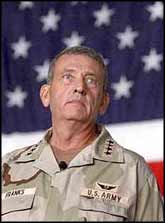Robyn E. Blumner
The doomsday scenario was laid out by Gen. Tommy Franks, the recently retired head of CentCom, in of all places the December edition of Cigar Aficionado magazine. “What is the worst thing that can happen in our country?” Franks asked rhetorically. “Two steps. The first step would be a nexus between weapons of mass destruction . . . and terrorism.” The second step would be “the western world, the free world, loses what it cherishes most, and that is freedom and liberty we’ve seen for a couple of hundred years in this grand experiment that we call democracy.”
Franks suggested that a “massive casualty-producing event” might cause “our population to question our own Constitution and begin to militarize our country.”

For those tapped into the alternative media world of the Internet, the quotes bounced around faster than a Paris Hilton sex video. Franks, a four-star general, was warning of a future he sees as possible if not likely. Our economy might survive another terrorist assault, so might our mass culture - it’ll take more than a nuclear device to shut up Jessica Simpson - but the prognosis for the Constitution is bleak.
New York Times columnist Thomas Friedman repeated the alarm in a recent column when he said that virulent terrorism “is the most serious threat to open societies, because one more 9/11 and we’ll really see an erosion of our civil liberties.”
We ain’t seen nothing yet, according to the experts. If terrorism’s sting is felt again, fascism may be its aftermath. These pundits and prognosticators are saying out loud what anyone who has been following the government’s actions since 9/11 already senses.
Consider how far down this road we’ve already moved: The passage of the USA Patriot Act has given the government extraordinary powers to spy on Americans without cause. The FBI has been unleashed to surveil Americans engaged in antiwar protests. Immigrants have been secretly detained and deported by the hundreds. And two Americans have been imprisoned indefinitely and without charge as “enemy combatants.” (Only last week did the Defense Department agree to grant one of those, Yaser Esam Hamdi, access to a lawyer.) To all this, the courts and Congress have barely blinked.
In Guantanamo Bay, Cuba, we are holding more than 600 prisoners from 42 countries who are being refused prisoner of war status or any other formal legal designation. The Bush administration believes these prisoners should have no access to American courts to challenge the legitimacy of their detention and the president alone, as commander in chief, has the power to decide each man’s fate. The Justice Department will argue this in two cases before the USA Supreme Court this term.
In essence, the administration is asserting something unprecedented - that the kinds of emergency powers that might flow to the military on the battlefield should be available in the “war on terrorism.”
But combating terrorism is not the same as prosecuting a traditional war. As the administration itself has explained, with terrorism there is no discrete enemy, place of battle or anticipated end to hostilities. Emergency powers take on a very different sheen when the emergency is permanent and everywhere.
Egypt has slouched toward totalitarianism in this way. Since 1981, the country has used fighting terrorism as a justification to repeatedly renew emergency laws that allow the government to hold suspects without charge and try civilians in military courts - with the USA State Department objecting the whole way. Conveniently, Egyptian President Hosni Mubarak has also used the laws to thwart prodemocracy efforts and dispatch political enemies.
It was the Nine Years’ War in Aldous Huxley’s Brave New World that facilitated the seizure of power by the world reformers who then took control of nearly all human and social development. In 1984, George Orwell described Oceania as in a constant state of war with a changeable enemy who “always represented absolute evil.” These inventors of the great dystopias understood the way governments use war and its associative fear and instability to consolidate power. Despotism thrives on insecurity. Abraham Maslow’s hierarchy of needs puts safety right behind food, water and sleep. Humans naturally crave stability and are willing to sacrifice values such as liberty in its pursuit.
Within the current government there are those who would exploit this weakness. Before it was leaked to the Center for Public Integrity, a bill dubbed the Patriot Act II was in development at the Justice Department. The draft would have allowed for the stripping of American citizenship and the secret detention of citizens; and popular conjecture had it that Attorney General John Ashcroft was just waiting for another terror attack to roll the bill out. In that moment of national panic, a malleable Congress wouldn’t resist.
So, will another major terrorist attack on American soil lead, as Franks warns, to the end of freedom and democracy? There aren’t many hopeful signs to the contrary.
Article courtesy of St. Petersburg Times